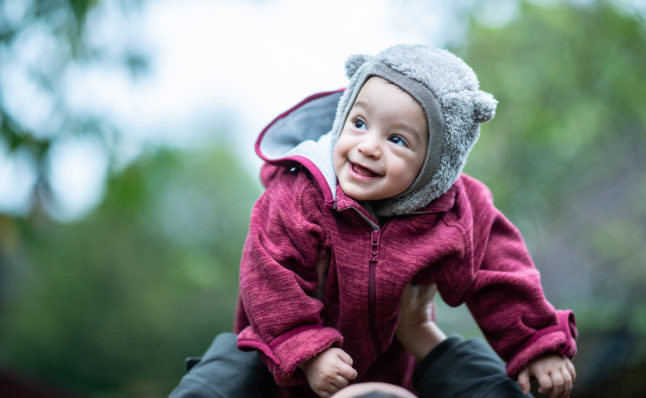EXPLAINED: What Germany's most popular baby names have in common

The Society for the German Language on Monday announced its latest list of the most popular newborn names. Here's what they share in common, and how they differ from German-speaking neighbouring countries.
Emilia and Noah again lead the list of Germany's most popular baby names.
As with the two previous years, they snagged first place on a list of the most common first names for newborns in 2022, published by the Society for the German Language (GfdS) in Wiesbaden on Monday.
Among girls, Sophia/Sofia and Emma follow, while among boys Matt(h)eo/Math(h)eo and Leon rank as the top picks for new parents.
The lists are based on data from more than 750 registry offices, which had submitted almost one million name entries according to the GfdS,.
"This means that almost 93 percent of all first names given last year are covered," the society said in a statement.
Overall, the top ten most popular first names tend to be very consistent: new parents still like to give their offspring short or very short names - but often with many vowels.
READ ALSO: These were the most popular German baby names in 2021
"Sound and brevity also determine the most popular first names in 2022," says GfdS Managing Director Andrea Ewels. "The shorter, the better."
This is a trend that linguists have already been observing for a good 20 years, she said.
Beautiful, melodic sounds seems to be the decisive criterion for most parents when picking a name for their newborns, said Ewels.
This trend was shown by the top names Noah and Emilia, as well as other names on the top ten list such as Mia, Lina, Mila or Leon, Finn and Paul.
In addition to as many vowels as possible, sonorous consonants like "l", "m" and "n" also made first names soft and song-like.
"They give them a certain phonetic aesthetic," said Ewels. The current favourite first letters are E, M and L: a full 13 of the top 20 names begin with one of these letters.
Diversity is the name of the game
Just because a name landed on the top 10 list, though, it doesn't mean that every other child at the Kita will share it, said Ewels.
Even the most common girl's name, Emilia, has a share of just under 1.4 percent of all female names given.
Among boys, Noah was only slightly above a rate of 1.4 percent.
Parents in Germany are also opting for an increasing array of names. The registry offices had reported almost 70,000 different names last year, up from about 65,000 names in the previous year.

A one-year old girl in Menden, North Rhine-Westphalia being held up by her mother. Photo: picture
This is not surprising considering how multicultural Germany is becoming: As of 2022, there were around 20.2 million first- or second-generation migrants in Germany - making up 24.3 percent of the total population.
READ ALSO: How many people in Germany have an 'immigration history' in 2023?
Many of those migrants, in turn, have children with names that deviate from traditional norms.
"This diversity of names reflects social diversity. There are also differences depending on the German state; in Berlin, for example, the name Mohammed now ranks first in frequency among boys, while in Saarland and Mecklenburg-Western Pomerania it is Finn,” said Ewels.
Favourite names do of course change in Germany, this usually occurs over several decades, according to linguists. - but according to the experience of linguists, it happens slowly over several decades.
A look at the GfdS archive also shows this: In 2012, Sophie and Luca topped the list, resembling the current ranking to some extent.
Yet in 2002, Marie and Alexander - both names that aren’t among the most popular anymore - snagged the respective first places.
In 1982, Stefanie and Christian were still the most frequently given baby names in former West Germany.
READ ALSO: These are Germany's most popular baby names for 2020
Names in other German-speaking countries
The Bundesrepublik had some stark similarities - and differences - to its German-speaking neighbours.
In Austria, the 2021 top-ten list contains four names each that are also among the top names in Germany, namely Emilia, Emma, Mia and Hanna as well as Paul, Elias, Leon and Noah.
However, with Valentina, Maximilian and Tobias, longer, more consonant names are also represented.
According to the linguists, the top list for German-speaking Switzerland in 2021 includes five names that are also among the most popular in Germany.
The other names are rather rare in the Bundesrepublik, such as Elena, Alina, Elin and Malea for girls and Nino and Leano for boys.
Comments
See Also
Emilia and Noah again lead the list of Germany's most popular baby names.
As with the two previous years, they snagged first place on a list of the most common first names for newborns in 2022, published by the Society for the German Language (GfdS) in Wiesbaden on Monday.
Among girls, Sophia/Sofia and Emma follow, while among boys Matt(h)eo/Math(h)eo and Leon rank as the top picks for new parents.
The lists are based on data from more than 750 registry offices, which had submitted almost one million name entries according to the GfdS,.
"This means that almost 93 percent of all first names given last year are covered," the society said in a statement.
Overall, the top ten most popular first names tend to be very consistent: new parents still like to give their offspring short or very short names - but often with many vowels.
READ ALSO: These were the most popular German baby names in 2021
"Sound and brevity also determine the most popular first names in 2022," says GfdS Managing Director Andrea Ewels. "The shorter, the better."
This is a trend that linguists have already been observing for a good 20 years, she said.
Beautiful, melodic sounds seems to be the decisive criterion for most parents when picking a name for their newborns, said Ewels.
This trend was shown by the top names Noah and Emilia, as well as other names on the top ten list such as Mia, Lina, Mila or Leon, Finn and Paul.
In addition to as many vowels as possible, sonorous consonants like "l", "m" and "n" also made first names soft and song-like.
"They give them a certain phonetic aesthetic," said Ewels. The current favourite first letters are E, M and L: a full 13 of the top 20 names begin with one of these letters.
Diversity is the name of the game
Just because a name landed on the top 10 list, though, it doesn't mean that every other child at the Kita will share it, said Ewels.
Even the most common girl's name, Emilia, has a share of just under 1.4 percent of all female names given.
Among boys, Noah was only slightly above a rate of 1.4 percent.
Parents in Germany are also opting for an increasing array of names. The registry offices had reported almost 70,000 different names last year, up from about 65,000 names in the previous year.

This is not surprising considering how multicultural Germany is becoming: As of 2022, there were around 20.2 million first- or second-generation migrants in Germany - making up 24.3 percent of the total population.
READ ALSO: How many people in Germany have an 'immigration history' in 2023?
Many of those migrants, in turn, have children with names that deviate from traditional norms.
"This diversity of names reflects social diversity. There are also differences depending on the German state; in Berlin, for example, the name Mohammed now ranks first in frequency among boys, while in Saarland and Mecklenburg-Western Pomerania it is Finn,” said Ewels.
Favourite names do of course change in Germany, this usually occurs over several decades, according to linguists. - but according to the experience of linguists, it happens slowly over several decades.
A look at the GfdS archive also shows this: In 2012, Sophie and Luca topped the list, resembling the current ranking to some extent.
Yet in 2002, Marie and Alexander - both names that aren’t among the most popular anymore - snagged the respective first places.
In 1982, Stefanie and Christian were still the most frequently given baby names in former West Germany.
READ ALSO: These are Germany's most popular baby names for 2020
Names in other German-speaking countries
The Bundesrepublik had some stark similarities - and differences - to its German-speaking neighbours.
In Austria, the 2021 top-ten list contains four names each that are also among the top names in Germany, namely Emilia, Emma, Mia and Hanna as well as Paul, Elias, Leon and Noah.
However, with Valentina, Maximilian and Tobias, longer, more consonant names are also represented.
According to the linguists, the top list for German-speaking Switzerland in 2021 includes five names that are also among the most popular in Germany.
The other names are rather rare in the Bundesrepublik, such as Elena, Alina, Elin and Malea for girls and Nino and Leano for boys.
Join the conversation in our comments section below. Share your own views and experience and if you have a question or suggestion for our journalists then email us at [email protected].
Please keep comments civil, constructive and on topic – and make sure to read our terms of use before getting involved.
Please log in here to leave a comment.